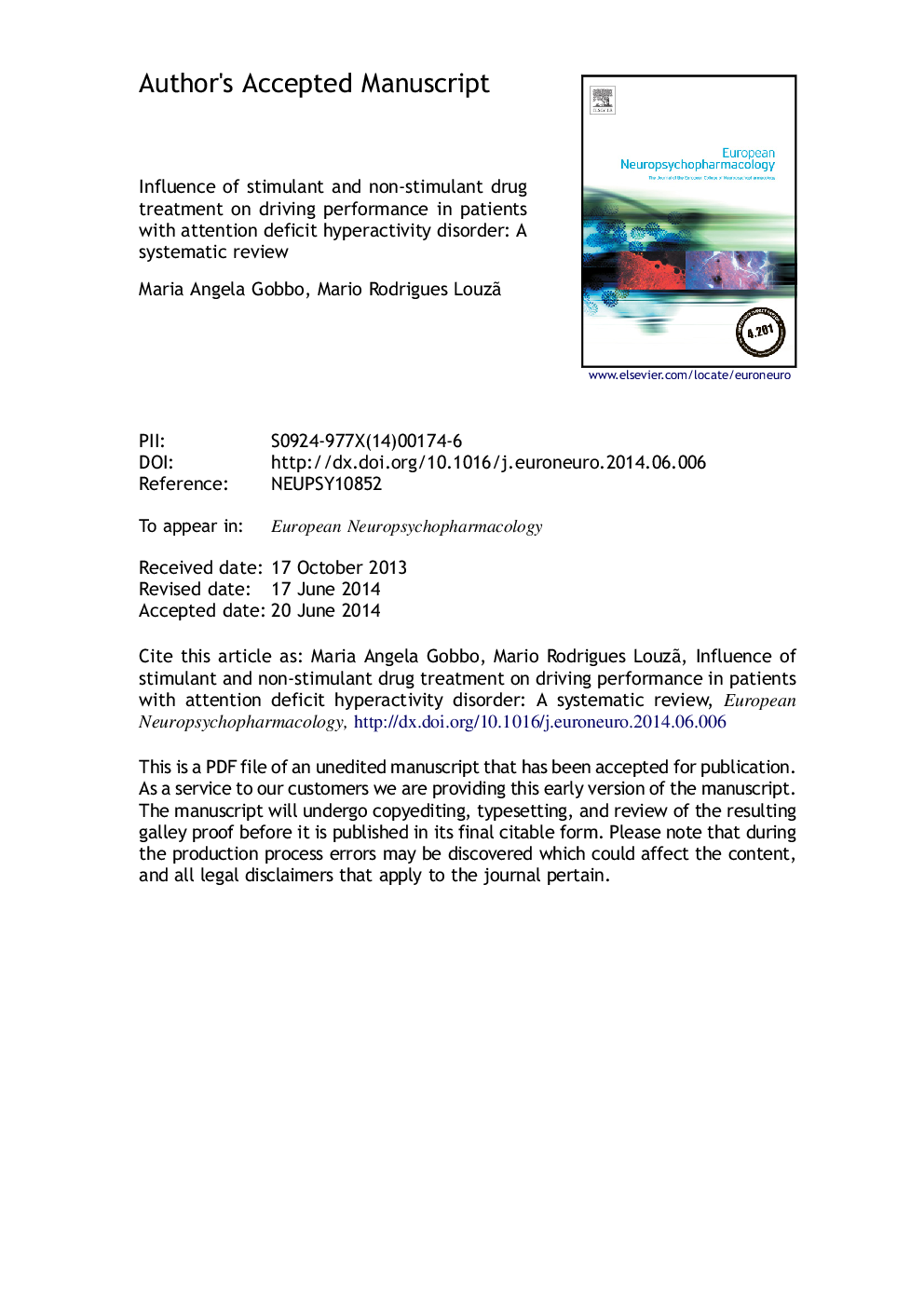| کد مقاله | کد نشریه | سال انتشار | مقاله انگلیسی | نسخه تمام متن |
|---|---|---|---|---|
| 10299597 | 539815 | 2014 | 64 صفحه PDF | دانلود رایگان |
عنوان انگلیسی مقاله ISI
Influence of stimulant and non-stimulant drug treatment on driving performance in patients with attention deficit hyperactivity disorder: A systematic review
ترجمه فارسی عنوان
تأثیر درمان دارویی محرک و غیر محرک بر عملکرد رانندگی در بیماران مبتلا به اختلال بیش فعالی کمردرد: یک بررسی سیستماتیک
دانلود مقاله + سفارش ترجمه
دانلود مقاله ISI انگلیسی
رایگان برای ایرانیان
کلمات کلیدی
اختلال بیش فعالی کمبود توجه، رانندگی، رفتار، روانپزشکان، اتمسستین،
موضوعات مرتبط
علوم زیستی و بیوفناوری
علم عصب شناسی
روانپزشکی بیولوژیکی
چکیده انگلیسی
Adults with Attention Deficit Hyperactivity Disorder (ADHD), especially teenagers and young adults, show important car driving impairments, including risky driving, accidents, fines and suspension of driver׳s license. We systematically reviewed the efficacy of stimulant and non-stimulant drugs on driving performance of ADHD patients. We searched several databases for randomized controlled trials (RCTs) published through March, 2013. Fifteen RCTs (the majority with crossover design) evaluated methylphenidate (MPH) immediate-release (MPH-IR), MPH osmotic-controlled oral system (MPH-OROS), MPH transdermal system (MTS), extended-release mixed amphetamine salts (MAS-XR); atomoxetine (ATX) and lisdexamfetamine (LDX). Methods varied widely; including simulators and/or cars and different courses and scenarios. Various outcomes of driving performance, including a 'composite' or 'overall' driving score were considered. In general, stimulants improved driving performance in ADHD patients (either in RCTs conducted in simulators and/or cars). MPH-OROS improved driving performance compared with MAS-XR, placebo, or no-drug conditions. Although MPH-OROS and MPH-IR produced similar improvements during the day, MPH-IR lost its efficacy in the evening. MAS-XR also improved driving performance, but worsened driving performance in the evening. MTS (one study) showed a positive effect, but drug compliance varied widely across patients. LDX had positive effect on driving (two studies with the same sample). Studies with ATX report conflicting results. Improvement was more consistent in teenagers and young adults. In general, treatment with psychostimulants or ATX in therapeutic dosages had no negative impact on driving performance of ADHD patients. To conclude, treatment with stimulants in therapeutic doses improves driving performance in ADHD patients, especially teenagers and young adults.
ناشر
Database: Elsevier - ScienceDirect (ساینس دایرکت)
Journal: European Neuropsychopharmacology - Volume 24, Issue 9, September 2014, Pages 1425-1443
Journal: European Neuropsychopharmacology - Volume 24, Issue 9, September 2014, Pages 1425-1443
نویسندگان
Maria Angela Gobbo, Mario R. Louzã,
